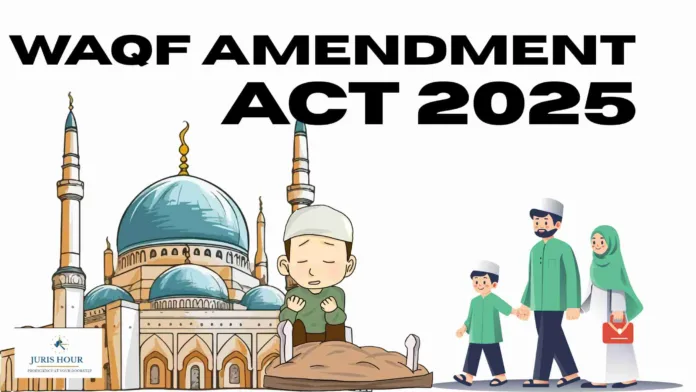The document outlines changes to the existing Waqf Act in India, which governs properties dedicated by Muslims for religious or charitable purposes (called “waqf”). These amendments, effective as of 2025, aim to update rules, improve management, and address issues like disputes and misuse.
Here’s what it says in simple terms:
Key Changes to Definitions (Section 2 & 3)
- Exemption for Trusts: Muslim trusts set up for charity, even if not called “waqf,” are not covered by this Act, no matter what courts say.
- New Terms Added:
- “Aghakhani waqf” and “Bohra waqf” refer to waqfs created by specific Muslim communities (Aghakhanis and Bohras).
- “Collector” means a district land official or someone they appoint.
- “Government property” includes anything owned by the central or state government, municipalities, etc.
- “Portal and database” refers to an online system for managing waqf records.
- Who Can Create a Waqf: Only someone practicing Islam for at least 5 years, who legally owns the property, can create a waqf. It must be genuine, not a trick.
New Rules (Sections 3A to 3E)
- Ownership Requirement: You must own the property legally to make it a waqf, and it can’t take away inheritance rights (especially for women).
- Online Registration: All waqfs registered before 2025 must submit details (like property boundaries, income, and management) to an online portal within 6 months. This can be extended by another 6 months if there’s a good reason.
- Government Property: If a property is claimed as waqf but belongs to the government, it’s not a waqf. A senior official (above Collector rank) will investigate and decide.
- Protected Monuments: Waqf claims on historical monuments or protected areas are invalid.
- Tribal Lands: Land owned by Scheduled Tribes (under the Constitution) cannot be declared waqf.
Survey and Registration (Sections 4, 5, 6, 36, 37)
- Survey by Collector: Surveys of waqf properties will now be done by the Collector (not a Survey Commissioner) following state revenue laws.
- Public Notice: Before updating land records, a 90-day public notice must be given in newspapers, and people affected get a chance to speak.
- Waqf Deed Required: Starting 2025, a waqf must have a written deed to be valid. The Collector will check applications and report any disputes or government ownership.
Management and Boards (Sections 9, 13, 14)
- Central Council: The council overseeing waqfs will include the Union Waqf Minister, MPs, Muslim scholars, judges, and professionals. At least two members must be women, and two must be non-Muslims.
- State Boards: Each state’s waqf board will have up to 11 members, including a Chairperson, an MP, an MLA, a mutawalli (caretaker), and others. Two must be women, two non-Muslims, and it must represent Shia, Sunni, Bohra, Aghakhani, and backward Muslim groups.
- Separate Boards: States can create separate boards for Bohra and Aghakhani waqfs if needed.
Roles and Responsibilities (Sections 23, 46, 47)
- Chief Executive Officer: Each waqf board will have a full-time CEO, at least a Joint Secretary rank, appointed by the state.
- Accounts and Audits: Waqfs must submit yearly accounts by October (not July). Waqfs earning over ₹1 lakh annually need audits by state-approved auditors. The Central Government can also order audits.
Mutawalli (Caretaker) Rules (Section 50A, 61, 64)
- Who Can’t Be a Mutawalli: You can’t be a mutawalli if you’re under 21, mentally unfit, bankrupt, jailed for 2+ years, encroached on waqf property, or were removed for mismanagement.
- Penalties: Failing to follow rules (like handing over property or submitting accounts) can lead to fines (₹20,000 to ₹1 lakh) or up to 6 months in jail.
Disputes and Tribunals (Sections 6, 7, 83)
- Time to Challenge: You have 2 years (up from 1) to dispute a waqf claim, with extensions if there’s a good reason.
- Tribunal Changes: Tribunals will have three members (a District Judge as Chairman, a Joint Secretary-level officer, and a Muslim law expert). Appeals go to the High Court within 90 days.
Other Updates
- Government Property Disputes: If waqf property is disputed or government-owned, it won’t be registered until resolved by a court.
- Land Acquisition: References to old laws are updated to the 2013 Land Acquisition Act.
- Online System: Many processes (registration, audits, notices) will now use the online portal.
Read More: P&H High Court Imposes Rs. 50 Lakh Cost On Customs For Delayed Release Of 89,420 Kgs Of Kiwi



![Udaipur District Court Quashes ACJM Order Upholding Coma Patient’s Will Without FSL Verification [READ ORDER] Udaipur District Court Quashes ACJM Order Upholding Coma Patient’s Will Without FSL Verification [READ ORDER]](https://www.jurishour.in/wp-content/uploads/2025/04/udaipur-district-court-218x150.webp)

